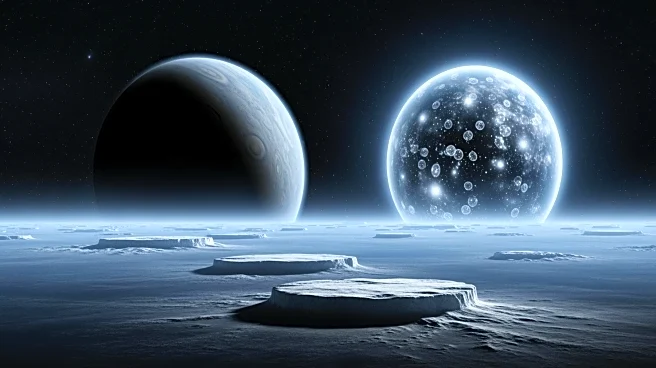What's Happening?
A recent study has uncovered a variety of organic molecules spewing from Saturn's moon Enceladus, based on data collected by NASA's Cassini spacecraft. The discovery was made by analyzing previously unexamined
data from Cassini's Cosmic Dust Analyzer (CDA) mass spectrometer. The spacecraft, which ended its mission in 2017, had flown through the icy plumes erupting from Enceladus, capturing particles that revealed complex organic compounds. These compounds include carbon chains and rings, some containing oxygen, which are precursors to more complex organic molecules. The findings suggest that the conditions on Enceladus might be similar to those near hydrothermal vents on Earth, potentially indicating a habitable environment beneath its icy surface.
Why It's Important?
The discovery of organic molecules on Enceladus is significant as it enhances the possibility of habitability on the moon. This finding could have profound implications for the search for extraterrestrial life, as it suggests that Enceladus, along with Jupiter's moon Europa, might harbor environments conducive to life. The presence of complex chemistry within Enceladus's subsurface ocean could provide insights into the potential for life beyond Earth. This discovery has spurred interest in future missions, such as the European Space Agency's L4 project, which aims to explore Enceladus further and search for signs of life.
What's Next?
The European Space Agency is planning the L4 mission, set to launch between 2040 and 2042, to further investigate Enceladus. The mission will aim to land on and orbit the moon, sampling its plumes and exploring other Saturnian moons. Additionally, two missions are currently en route to Jupiter to study its moon Europa, which also has a subsurface ocean. These missions, equipped with advanced technology, are expected to provide more detailed data on the potential habitability of these icy moons.
Beyond the Headlines
The findings from Enceladus could reshape our understanding of where life might exist in the solar system. The presence of organic molecules in such environments challenges the traditional view that life requires Earth-like conditions. This discovery could lead to a broader definition of habitability and influence future space exploration strategies, focusing on icy moons and other celestial bodies with subsurface oceans.











